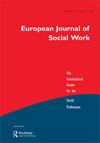Politics for social workers: a practical guide to effecting change
IF 1.6
3区 社会学
Q2 SOCIAL WORK
引用次数: 0
Abstract
pendent self, mind-body dualism, and culture as separate from biology are unfamiliar to many philosophies, and are rooted in Christian and liberal humanist beliefs. There is also a serious question about the relationship between social work and the state, however that is structured. Human rights may be defined differently by different philosophies, and social workers need to decide whether they are prepared to be agents of social control. The question is not whether Westernstyle social workers can work in state-controlled systems: it is whether social harmony can be achieved by state action, or whether it arises from action within natural communities. Henrickson gives enough detail of Confucian and Buddhist approaches to make one wish that he had started at this point, but that is ungenerous. One might hope that he would now go on himself to explore these and other approaches in proper detail. Some of his references provide signposts for those who wish to do the work themselves. He cites the Global Social Work Statement of Ethical Principles, of 2018, as a valuable foundation for future work, but this can only be effective if there is a serious attempt by social workers everywhere, to recognise how the profession is dominated by Western culture. This seems to be the real challenge of the book. The long argument about the origins of western social work does not open one’s eyes to the alternatives. Henrickson does eventually recognise that there are historical forms of social aid in other cultures, but suggests that these are social care, rather than professional social work. This needs elaboration.社会工作者的政治:实现变革的实用指南
独立的自我、心身二元论、以及与生物学分离的文化,对许多哲学来说都是陌生的,它们根植于基督教和自由的人文主义信仰。社会工作与国家之间的关系也存在一个严重的问题,无论这种关系是如何构建的。不同的哲学可能对人权有不同的定义,社会工作者需要决定他们是否准备好成为社会控制的代理人。问题不在于西方式的社会工作者能否在国家控制的系统中工作,而在于社会和谐能否通过国家的行动来实现,还是源于自然社区的行动。亨里克森对儒家和佛教的方法给出了足够多的细节,让人希望他从这一点开始,但这是不慷慨的。人们可能希望,他现在将自己继续详细探讨这些方法和其他方法。他的一些参考资料为那些希望自己做这项工作的人提供了指引。他引用2018年的《全球社会工作道德原则声明》作为未来工作的宝贵基础,但只有世界各地的社会工作者认真尝试,认识到这个行业是如何被西方文化主导的,这才会有效。这似乎是这本书的真正挑战。关于西方社会工作起源的长期争论并没有让人看到其他的选择。亨里克森最终承认,在其他文化中也有历史形式的社会援助,但他认为这些是社会关怀,而不是专业的社会工作。这需要详细说明。
本文章由计算机程序翻译,如有差异,请以英文原文为准。
求助全文
约1分钟内获得全文
求助全文
来源期刊

European Journal of Social Work
SOCIAL WORK-
CiteScore
3.50
自引率
20.00%
发文量
96
期刊介绍:
The European Journal of Social Work provides a forum for the social professions in all parts of Europe and beyond. It analyses and promotes European and international developments in social work, social policy, social service institutions, and strategies for social change by publishing refereed papers on contemporary key issues. Contributions include theoretical debates, empirical studies, research notes, country perspectives, and reviews. It maintains an interdisciplinary perspective which recognises positively the diversity of cultural and conceptual traditions in which the social professions of Europe are grounded. In particular it examines emerging European paradigms in methodology and comparative analysis.
 求助内容:
求助内容: 应助结果提醒方式:
应助结果提醒方式:


